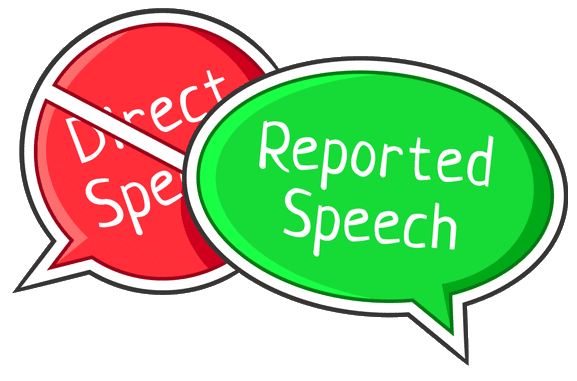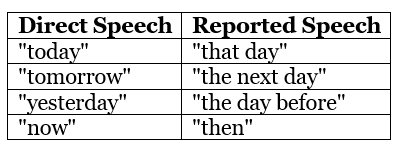Olympiad Notes: Reported Speech | English Olympiad class 5 PDF Download
Introduction

Reported speech (also known as indirect speech) is a way of telling someone what another person said, but without using the exact words. Instead of quoting the original speaker word for word, you change the sentence structure and sometimes the pronouns or tenses.
What is Reported Speech?
When you say what someone else has said without using quotation marks, you are using reported speech.
Example:
- Direct Speech: She said, "I am happy."
- Reported Speech: She said that she was happy.
Changes in Reported Speech
When we report someone’s words, some changes need to be made. Here are the most important ones:
A. Change of Pronouns
The pronouns often change to match the subject of the reporting sentence.
Example:
- Direct Speech: He said, "I am tired."
- Reported Speech: He said that he was tired.
(Here, "I" changes to "he.")
B. Change of Tenses
When the reporting verb is in the past tense (like "said" or "asked"), the verbs in the reported speech often change to a past form.

Time Expressions and Their Changes
Time expressions also change in reported speech.

Example:
- Direct Speech: She said, "I will do it tomorrow."
- Reported Speech: She said that she would do it the next day.
Reporting Questions
When reporting questions, the sentence structure changes.
1. Yes/No Questions:
- Direct Speech: "Do you like ice cream?"
- Reported Speech: He asked if I liked ice cream.
2. Wh- Questions:
- Direct Speech: "Where is your book?"
- Reported Speech: She asked where my book was.
 |
Download the notes
Olympiad Notes: Reported Speech
|
Download as PDF |
Reporting Commands and Requests
When reporting commands or requests, we use words like asked, told, or requested. The verb in the reported speech changes to the infinitive form (to + verb).
1. Direct Speech: "Please sit down."
- Reported Speech: He asked me to sit down.
2. Direct Speech: "Don’t talk in class!"
- Reported Speech: The teacher told us not to talk in class.
Practice Questions on Reported Speech
1. Change into Reported Speech:
- "I am hungry," said the boy.
Answer: The boy said that he was hungry.
2. Report the Question:
- "Where are you going?" she asked.
Answer: She asked where I was going.
3. Report the Command:
- "Close the door," said Dad.
Answer: Dad told me to close the door.
"I finished my homework," she said.
Tips for Mastering Reported Speech
- Practice with conversations: Take any dialogue and try converting it into reported speech.
- Memorize time changes: This will help you remember how to report conversations correctly.
- Listen for indirect speech in stories: Notice how people retell conversations in books or movies.
With these rules and practice, you’ll quickly become comfortable using reported speech in both writing and speaking!
|
22 videos|29 docs|27 tests
|
FAQs on Olympiad Notes: Reported Speech - English Olympiad class 5
| 1. What is reported speech and how is it different from direct speech? |  |
| 2. What are some common changes that occur in reported speech? |  |
| 3. How do you report questions in reported speech? |  |
| 4. How can commands and requests be reported in reported speech? |  |
| 5. What are some tips for mastering reported speech? |  |




















